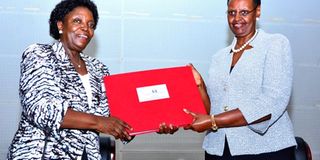Teachers accuse UNEB of aiding exam cheating

Final results. UNEB chairperson Mary Okwakol (left) hands over the 2016 UACE results to the minister of Education Janet Museveni on Tuesday. PHOTO BY DOMINIC BUKENYA.
What you need to know:
- James Tweheyo, the Uganda National Teachers Union (Unatu) general secretary said the practice has encouraged the flourishing of private schools near government-aided schools because they take advantage of the teachers.
- An examiner, who preferred to remain anonymous to speak freely, admitted that private schools pay them up to Shs1.5m salary per month. Government pays Shs600,000 to its teachers.
KAMPALA. Teachers’ Union has blamed Uganda National Examinations Board (Uneb) for allegedly perpetuating the habit of cheating in examinations that has widened the gulf between urban and rural schools.
They said urban schools have continuously outperformed their rural counterparts because of what teachers have called “a defective policy” that promotes cheating and bias.
The teachers have cited conflict of interest and preferential treatment during marking of exams. They said selected examiners, who, both set and mark national examinations teach their students topics aligned to the questions they have set, which is detrimental to schools without examiners on their teaching staff.
According to Mr James Tweheyo, the Uganda National Teachers Union (Unatu) general secretary, Uneb has ring-fenced the selection of national examiners for top schools, denying the opportunities to teachers working in remote places. He added that because these teachers are the ones who have set the questions and will mark them, they go back to their schools and teach their students what they set.
“We have schools which have almost every teacher as an examiner. We also have many schools which don’t have a single examiner and these teach syllabus for coverage and not inclined to examinations. Those schools where there are examiners, they may not complete the syllabus but teach what they know they have asked [in the examination papers],” Mr Tweheyo said in an interview.
“It is a vicious cycle. When Uneb is sorting out examiners, they give leverage to teachers in good schools. The poor schools are forced to go and borrow or sometimes pay handsomely for tests conducted in these high performing schools and regrettably, you find the questions similar at the end,” Mr Tweheyo said.
He continued: “Teachers in rural schools have been trying to access Uneb forever. Those who have are fished by the big schools because they are lured with a better pay.”
As a result, various schools which can give better remuneration have hired these teachers in the hope that their students will be tipped on what will be asked in the national examinations.
Unatu advises Uneb to give other teachers opportunities to assess national examinations so that all children across the country are placed at the same level.
However, Mr Dan Odongo, the Uneb executive secretary, disputed the allegations. He said their recruitment of examiners is based on a countrywide search. He explained that one of the qualities they look out for is teaching experience of at least three years. However, he added that because of the high number of applicants, the threshold has been raised to between seven to eight years of teaching in a candidate class.
He added that their recruitment also has affirmative action where, if the applicants are male and female, the latter is considered or if there is one coming from the rural area, the applicant is considered first instead of their urban counterparts.
“There is no deliberate effort by Uneb to have examiners from one school. The biggest problem is once one has trained as an examiner and their knowledge of assessment has improved, they become like hot cakes on the market. They get a lot of demand from schools and we don’t know when they have moved to other schools,” Mr Odongo said yesterday.
Mr Tweheyo said the practice has encouraged the flourishing of private schools near government-aided schools because they take advantage of the teachers. To him, if government is not careful, performance of its schools will continue to decline. He proposes that government makes a deliberate effort not to licence a private school where there is already an established government one.
“All private schools doing well are centred around the biggest government-aided schools performing well and they take advantage of teachers to part-time in their schools. If government is not careful, they will be in shock in the near future. Their big schools will be seen off by the private schools,” Mr Tweheyo warned.
He added: “Government should make sure when licensing private schools, they take into account location in terms of need and access. If there is already a government school, there is no need for them to licence another private one within the vicinity.”
An examiner, who preferred to remain anonymous to speak freely, admitted that private schools pay them up to Shs1.5m salary per month. Government pays Shs600,000 to its teachers.
“Private schools are doing better because they make their teachers comfortable and they target recruiting the examiners. Teachers have become part-timers in government schools where they are assured of a salary. They run on this concept that they are permanent and pensionable. Private schools monitor and if you don’t present good results, you are fired,” the source said.



